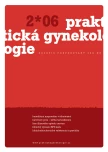-
Medical journals
- Career
Hereditary angioedema in gravidity
Authors: MUDr. Barbora Kuřecová 1; MUDr. Petr Janků 1; prof. MUDr. Jiří Litzman, CSc. 2
Authors‘ workplace: Gynekologicko-porodnická klinika LF MU a FN Brno 1; Ústav klinické imunologie a alergologie LF MU a FN u sv. Anny v Brně 2
Published in: Prakt Gyn 2006; 10(2): 57-59
Overview
The C1 inhibitor (C1 INH) deficiency is a rare, autosomal dominant imunologic disorder, which causes clinical disease named hereditary angioedema. This diease is characterised by a quick developement of painless and nonpruritic oedemas of subcutaneous and submucosal tissues. If gut mucosa is involved, the clinics resemble an acute abdomen. The laryngeal oedema may be lethal. Oedemas are caused by lack of C1 INH, complement cascade is not regulated properly and different vasoactive peptides are released. C1 inhibitor function is reduced due to impaired transcription (type I) or production of non functional protein (type II). Attacks are precipitated by physical insults, stress or infection. Most of the drugs used as prophylactic treatment are contraindicated in pregnancy. Moreover, labor is a kind of physical and psychological stress. Therefore pregnant women with hereditary angioedema should be carefully observed and treated in cooperation with immunologist.
Key words:
edema – complement – vasoactive substances – C1 inhibitor – hereditary angioedema – gravidity
Sources
1. Gompels MM, Lock RJ, Abinum M. et al. C1 inhibitor deficiency: consensus document British Society for Imunology. Clinical and Experimental Imunology 2005; 139 : 379-394.
2. Agostoni A, Aygoren-Pursun E, Binkley KE et al. Hereditary and acquired angioedema, Problems and progress. J Allergy Clin Immunol 2004; 114 (3 Suppl.): S51-S131.
3. Cicardi M, Bergamaschini L, Cugno M et al. Pathogenetic and clinical aspects of C1 inhibitor deficiency, Immunobiology 1998; 199 : 366-376.
4. Bowen T, Cicardi M, Frakas H. et al. Canadian 2003 International Consensus Algorithm for the Diagnosis, Therapy, and Management of Hereditary Angioedema. J Allergy Clin Immunol 2004; 114 (3): 629-637.
5. Fay A, Abinum M. Current management of hereditary angio – oedema (C1 esterase inhibitor deficiency). J Clin Pathol 2002; 55 : 266-270.
Labels
Allergology and clinical immunology Paediatric gynaecology Gynaecology and obstetrics Reproduction medicine
Article was published inPractical Gynecology

2006 Issue 2-
All articles in this issue
- Effect of corticosteroid administration on doppler velocimetry and fetus
- Hereditary angioedema in gravidity
- Follow-up in patients on tamoxifen
- Lesions of cervical glandular epithelium
- Tumor in small pelvis in a gynecological patient – rare case of benign appendix tumor: case report
- Clinical significance of HPV test
- Carcinoma of vagina
- Laboratory tests and pregnancy
- Cord blood: promising source of hematopoetic cells for transplantations
- Practical Gynecology
- Journal archive
- Current issue
- Online only
- About the journal
Most read in this issue- Tumor in small pelvis in a gynecological patient – rare case of benign appendix tumor: case report
- Carcinoma of vagina
- Follow-up in patients on tamoxifen
- Lesions of cervical glandular epithelium
Login#ADS_BOTTOM_SCRIPTS#Forgotten passwordEnter the email address that you registered with. We will send you instructions on how to set a new password.
- Career

